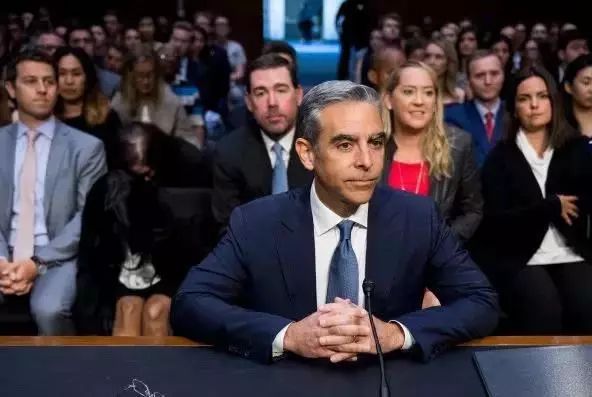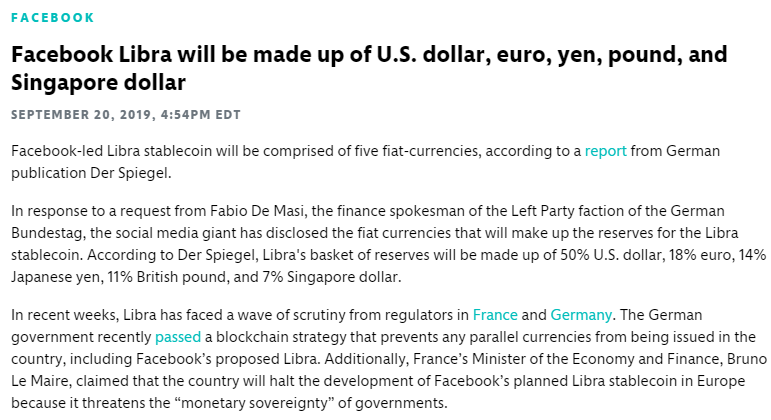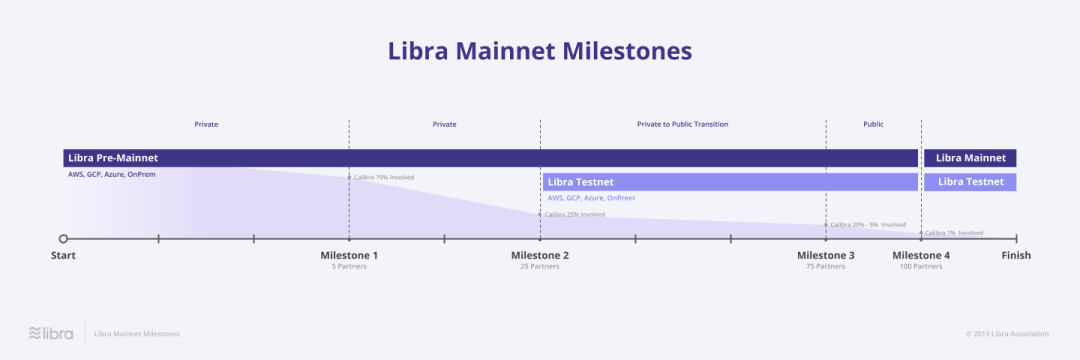Internal and external, Libra can seek hope in the crack
From the moment Facebook published the white paper, Libra's every move has been noticed by the world. Born to bring a halo, Libra got the attention that other blockchain projects could not have, and suffered more doubts and objections.
After all, in the eyes of many people, Libra is a "heterogeneous" of this era, synonymous with threats and crises.
- A text saying that IPFS: What is the expectation of Filecoin?
- The judge made a favorable Bitfinex ruling and rejected the file request filed by NYAG
- Monthly Report | September Domestic and Foreign Blockchain Policy: Virtual Currency Mining Supervision Strengthens Legal Digital Currency Multi-Country Support
As an emerging product, Libra goes beyond the regulatory framework of existing countries. Human beings have an inexplicable fear of the uncontrollable existence of the unknown, as is Libra. At present, most central banks and regulators in the US and Europe are skeptical or disagreeing with Libra that they will threaten the existing world financial and monetary system, damage privacy and monetary sovereignty, and encourage illegal crimes such as money laundering and terrorist financing. behavior.
On July 2, US time, the US House of Representatives Financial Services Committee sent a letter to Facebook executives such as Zuckerberg asking them to suspend all work on Libra and digital wallet Calibra.
On July 16, the Democratic Party members who occupied a majority of seats in the US House Financial Services Committee began to propose legislative proposals to prohibit large technology companies from providing financial services or issuing digital currencies. They also pointed out that if the technology giant violated the regulations, it would give 1 million a day. A fine for the dollar. The move was seen as a “sanction” for the Financial Services Commission on Libra and Facebook.
Subsequently, Libra project leader David Marcus was “invited” to participate in the hearing of Libra in both houses of the US Congress. At the hearing, US lawmakers repeatedly bombarded Libra and Facebook, arguing that Libra’s injury and threat to the United States was comparable to the 9/11 terrorist attacks. Even though Marcus repeatedly stated at the hearing that Libra is willing to cooperate with global regulators, it will not be launched until it is licensed, and said that the white paper was released in advance in order to have sufficient time to coordinate with the regulatory authorities, but this did not cancel. Concerns from many US lawmakers. At the same time, Marcus said that he has communicated with Switzerland, the country where the project is headquartered, but the Swiss side denied it.

On September 16th, the Libra team was once again asked to accept a “question” to discuss the stability of coins supported by financial institutions and technology companies in a meeting with the 26 central bank officials from the Federal Reserve and the Bank of England in Basel, Switzerland. Policy and regulatory risks. ECB Council Executive Benoit Klein bluntly stated at the meeting that Libra has not been tested as a new technology for the global payment system, but it poses serious risks to some public policies. In order to operate in Europe, the threshold for regulatory approval will certainly be high.
It is reported that the EU finance minister will propose to the finance ministers to make a global regulatory response to Libra and other "stabilized coins" at the G20 meeting held in mid-October, and called for the reform of the digital company's tax policy in 2020.
At the same time, the online petition for “stop Libra” initiated by the NGO “Financial Watch” on WeMove.EU has received more than 50,000 signatures. The petition called for the entire EU to unite against Facebook and Libra.
The EU will also introduce legislation to prevent Facebook's proposed Libra from destroying the eurozone's single currency system and being used as a money laundering tool. This is considered to be one of the most stringent regulatory measures for Libra to date.
In order to defend Libra, Facebook CEO Zuckerberg will testify on October 23 at the hearing of the House of Representatives "Facebook's questioning and its impact on financial services and housing," and he will be the only witness.
Under the pressure of European and American regulation, Libra and its followers struggled to move forward.
PayPal, one of the first 28 founding members of the Libra Association, officially announced its withdrawal from the Libra Association on October 4. The company said in a statement that PayPal has decided not to further join the Libra Association and will continue to work to advance the company's existing mission and business. PayPal did not directly explain the reason for the withdrawal. The Financial Times believes that it may be worried about Libra's opposition, and that Libra will encounter illegal activities such as money laundering.
Although PayPal hopes to "break up" with Libra in a "decent" way, in the "breakup declaration", PayPal will continue to support Libra's vision and look forward to continuing the dialogue on cooperation in the future, but PayPal's departure is still Libra. Suffered heavy losses.
After PayPal announced its withdrawal, Libra officially issued several tweets, hoping to reinvigorate the market:
“Building a modern, low-friction, highly secure payment network that empowers billions of people without financial services is a journey, not an end. It’s not easy to build an intergenerational payment network like the Libra project.”
“We recognize that change is difficult, and every organization that begins this journey must make its own risk and reward assessments of the changes Libra has promised.”
Before PayPal announced its withdrawal, the Wall Street Journal quoted people familiar with the matter, saying that under the strong opposition of US and European government officials, Visa, MasterCard and other financial partners who signed up to help establish and maintain Libra's payment network are re-establishing Consider your participation. Some people familiar with the matter said that some Libra supporters’ executives rejected Facebook’s request to publicly support the project because of concerns about inviting regulatory scrutiny.
Libra’s head David Marcus immediately clarified the report on The Wall Street Journal. He said that the first wave of members of the Libra Association will be formally formed in the next few weeks. For Libra, success requires loyal members, loyalty to Libra's mission is more important than anything else, and accuses the Wall Street Journal of being "nonsense."
But according to The Block, US Senators Sherrod Brown and Brian Schatz have recently sent letters to the three major payment giants Visa, Mastercard and Stripe, asking them to reconsider their partnership with Facebook-based stable currency project Libra.
Libra's founding member institutions may be facing turmoil and loss.
The withdrawal of PayPal has already hurt Libra. If Visa, MasterCard and Stripe retreat, it may directly shake Libra's desire to reconstruct the foundation of the global payment system. Because whether it is PayPal, Visa or MasterCard, it is a giant in the global payment and clearing field. Without them, even if Libra is successfully launched, there may be problems such as circulation due to insufficient infrastructure.
In addition to the withdrawal of the founding member institutions, the Libra project itself is no longer a piece of iron. According to foreign media reports, Libra Association product director Simon Morris left in the fifth month of joining the project. Morris's Linkedln shows that he left the Libra Association as early as August.
In addition, Libra's "forking" is also too late to prevent. Blockchain developer and Wireline co-founder Lucas Geiger announced at the Devcon 5 conference in Ethereum Japan on October 9 that a blockchain called "OpenLibra" will be created. OpenLibra will use the same Move virtual machine as Libra, enabling users to use the state machine with the Move language. OpenLibra will be an unlicensed version of the Facebook blockchain.
The founding member institution withdrew, the team members left, and the technology was “forked”. Libra’s internal worries were no easier than external troubles.
On September 11th, in order to seek compliance, the Libra Association applied for a payment system license from the Swiss Financial Market Supervisory Authority (FINMA). Libra said in a statement, "We are engaged in a constructive dialogue with FINMA and are encouraged to make the open source blockchain network a regulated, low-friction, highly secure payment system."
Later, in an interview with French media, Librarian Association Managing Director and CEO Bertrand said that it is unreasonable for Libra to include the French currency in the Libra Reserve Fund, which will affect the central bank's monetary policy, because the actual situation is that the French currency will be affected by a basket of currencies. Libra, and the Libra Reserve's maximum size will not exceed 200 billion US dollars, will not have a huge impact on the global monetary system. Facebook executives such as Zuckerberg and David Marcus have also stated on several occasions that Libra will not threaten international currency sovereignty and other related remarks.
Libra is also actively promoting the development of the project while trying to find a dialogue with the regulator and obtaining permission.
On September 21, in a letter replied to the German legislator, Facebook officially announced the composition of Libra's “a basket of currencies” reserve: the US dollar will become the main currency supporting Libra, accounting for 50%, and the rest by the euro ( 18%), Japanese Yen (14%), British Pound (11%) and Singapore Dollar (7%) . Prior to this, the composition of a basket of currencies has always been one of the issues that the market is closely watching.

Although a lot of controversy has arisen, Libra has made a promising development since the white paper was released in June. After the test network was launched, developers have released several Libra blockchain browsers (Libranaut, Libraview, Librabrowser, Libexplorer, etc.), and some projects have integrated Libra test networks into digital wallets (such as ZenGo), and other blocks. The chain project also began to integrate Move into its own blockchain system (such as Solana).
On October 3, the Libra Association detailed the development route plan of the project team before the launch of the Libra main network in the first published project roadmap: In the first phase, the Libra Association is expected to invite five partners to deploy the entire node on the network. Libra wallet CaLibra's development team will play an important role in node operations; Libra's main network will be launched at the end of the fourth phase of the roadmap, when 100 partners are expected to run the full node, and CaLibra will exit the dominant position as A normal node exists.

In addition, as the Libra project moves toward the main network milestone, the Libra team created a staging primary network environment called “Pre-Mainnet” in order to keep more nodes online while the test network continues to run. At this stage, only partner nodes can access Pre-Mainnet and allow them to connect to each other. A few partners have deployed nodes and can support communication with each other. Libra expects more partners to come online soon, and to ensure that the Libra network meets stringent performance benchmarks and overall system stability requirements before officially opening up to the new.
All of this is ready for Libra's main online line, and Libra's supporters see the dawn of hope in the dark.
Text: Zhaosheng
Source: 01Binary
We will continue to update Blocking; if you have any questions or suggestions, please contact us!
Was this article helpful?
93 out of 132 found this helpful
Related articles
- Zuckerberg "Second Palace" attends the hearing Libra can break through the blockade
- September public chain observation: How to treat Bitcoin mining after the market?
- How to create an encrypted startup, you need to avoid the minefield
- Investment management company VanEck: Bitcoin is a great tool for diversifying your portfolio
- CFTC Chairman: ETH is not a security, it is a commodity; the forked asset should be classified into the same category as the original asset.
- The United Nations has set up a cryptocurrency fund to accept bitcoin and Ethereum donations.
- Facebook is putting pressure on the currency, and central banks are issuing digital currencies.






